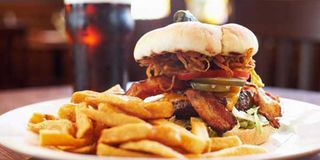The danger of junk food addiction

Hamburger and french fries
It is a busy evening in one of fast food restaurants in Nairobi. Scores of young people are sauntering into the eatery to indulge in what they love most — deep-fried chicken, spicy flavoured potato chips, king-size burgers, pizza and soft drinks. Most of them are college students, going by the bags they are carrying.
Some few metres away is another restaurant. A similar scene is replicated. A group of young people orders fat drenched snacks and several cans of soda, others can’t resist the urge of taking ice-cream. They devour the snacks with relish, washing down each plate with a mouthful of soda.
And as they do this amid banter, they are certainly unperturbed or unware of the effects of consuming too much of such foods, one of them which is courting lifestyle diseases.
Junk food make up the main meals for most young people in urban and peri-urban centres. The foods are all the rage. You will see the oily, deep-fried chicken somersaulting from various fast food restaurant windows from as early 7am. The inviting potato chips are deliberately put next to appetising sausages and smokies and the endless volumes of refrigerators stalked with sodas. Then we have the human billboards around town with catalogues announcing where to get the coolest offer of your favourite pizza.
Equally, you do not need to look far to identify the fast food restaurants as they are located at strategic places in towns.
Their target market is mainly young people, some living fast-paced life and eager to appear cool among their peers as they devour the copious amounts of the foods, sometimes while walking on the streets.
Nutritionist Faith Kariuki of Afya Bora Nutrition and Wellness Centre says that the reason a lot of young people tend to get drawn to junk food is because these foods are marketed as the cooler alternative.
Daily diets
“Young people are more likely to meet up at a first food joint than anywhere else because of the attractive offers that these joints have. They also tend to think that eating at fast food restaurants is cool, thus the need to keep up appearances,” Kariuki says.
Another thing that could easily draw young people to junk food is the fact that these joints are everywhere in town. Consequently, the food has become cheaper.
“These joints are everywhere in town and there is just something that seeing something everywhere including on attractive billboards does to the mind,” she says. She also says that some parents are to blame for exposing their children to junk food from a young age.
But is it safe for young people to continue waxing lyrical and assume that junk food is good enough?
Are you one of the young people who believe that you can consume anything without caring about the effect that this has on you because you are under the impression that you are invincible and you still have the rest of your life before you?
MyNetwork spoke to two young people who took us through their typical daily diet and why, like many of their peers, are totally unperturbed by the effects of too much junk food in their systems.
These two young people might be a paradigm into the eating habits of urban youth who believe that there is absolutely nothing wrong with eating too much junk. And in their wildest imagination, there are no definite reasons why junk food could be dangerous.
Mary Muthoni, 23, a student at Moi University, says she does not like real food such as ugali, greens, rice or fruits because they are not sweet. “I do not have appetite for real food,” she says.
On a typical day, Muthoni skips breakfast at home and once she gets to town, she eats samosas or smokies. She then snacks on crisps or biscuits during break time. Her lunch normally comprises chips or bhajias and then on her way home, she will have a cone of ice cream. Soda features prominently in most of her meals.
“I try to eat real food but in very small quantities because they just taste plain and are unappealing,” she says.
Fahim Abdul, 25, also a student at Moi University, says that the real, healthy food just tastes weird and even at home, he eats junk most times.
“The good food that we are supposed to eat just tastes plain so even when I am at home and I have to choose between cooking a proper meal and junk, junk food is what I will opt for,” he says.
Fahim says he often skips breakfast, but when he doesn’t, he drinks soda.
“I think I take about two litres of soda in a day,” he says.
In between breakfast and lunch, he will take soda again, and a samosa or a sausage. His lunch options are burgers, sandwiches, and fries, not forgetting a can of soda. After classes, he finds himself snacking on crackles, cakes and biscuits.
“Occasionally, I have healthy foods for dinner such as chapati, beans and biryani but this is not often because even in the environment that I live in, there is a lot of junk food around,” Fahim says.
Fahim once considered the importance of eating healthy and even exercising, but he stopped bothering at some point. “I did not really see the point of caring about healthy food,” he says.
Muthoni says that she has never really considered the effects that consuming a lot of junk food could have on her well-being especially because she is small-bodied and she does not have to worry about becoming overweight – which for her is what she would worry more about.
“I sometimes look at the effects of food but that is just for formality purposes. I do not really pay attention,” she says.
Doctor’s word
Do any of these two young people sound like you? Have they mirrored your diet and voiced your sentiments about all the healthy eating noise that you are always hearing about but fail to connect to yourself?
Anand Grover, UN rapporteur on the right to health in a 2014 report warned that junk food is dangerous because it curtails your health. According to the report, 2.1 billion people worldwide are overweight or obese, and at least 2.8 million people die every year because of weight related complications brought about by unhealthy foods.
But do such statistics make any sense to the average university student in a city such as Nairobi?
We spoke to a medical expert who took us through what the junk food that you are consuming in excess is harming your body and why it is important to have all the other necessary ingredients in your body to ensure that your bodily processes run properly.
Dr Lyudmyla Shchukina, a psychotherapist at Holistic Living — the first Medical Clinic in Kenya that specialises in scientifically proven weight loss solutions — says: “The subject of junk food is very important because the food has harmful, invisible effects on our body. People put different priorities in their lives: relationships, finances, study, career, emotions, but none of these matters if you do not take care of your body.”
“We must begin by realising and assessing the effects of junk food and extra weight in our bodies. If you have bad eating habits, regardless of age, the effects begin to show. You may develop some discomforts in the body like indigestion, or bloated stomach, heart burn, extra weight, obesity, allergy or unexplained tirednes. The body is the most complicated system in this universe. Metabolic reactions in the body need proteins, carbohydrates, vitamins, macro- and micro- elements and other nutrients. An increased amount of certain ingredients at the expense of others can lead to a dis-balance in biochemical reactions and gradually lead to different diseases,” she adds.
Perhaps the greatest challenge of consuming junk food mindlessly is the fact that its effects are invisible and do not always show up immediately. The doctor notes that foods that are deep fried or smoked contain a very high amount of calories from fat or carbohydrates, a lot of unsaturated and processed fats that increase low-density lipoproteins – “bad” cholesterol. The good fat is saturated fat.
Heart attack
“These substances poison the body and the more you ingest them, the more harm you continue to do to your body unknowingly,” she warns.
Dr Shchukin says that there is a tight connection between junk food and obesity and diabetes, high blood pressure, stroke, cancer, infertility and so on —they do not draw lines when it comes to age.
The doctor notes that by continuously eating junk food, you risk developing arteriosclerosis, a condition where your blood vessels harden and over time, cholesterol plaque builds up, narrowing the arteries. This would restrict blood flow in your body leading to a possible complete cut off the blood supply. This is the way to heart attack and stroke.
“People who give priority to junk and high calorie food have very high chances of developing early arteriosclerosis and obesity when they are still young,” she says.
Studies have found that children as young as 10 to 14 can show the early stages of atherosclerosis. “In my practice of over 25 years, I have seen university students dying of heart attack and the main culprit is obesity that can so obviously be traced back to junk food,” she says.
Dr Shchukin advises that we should ensure our bodies receive all the vital nutrients by making proper choices when it comes to the regular daily foods that we choose to consume.
“Medical science dose not completely prohibit junk food. Indeed, no food is categorically prohibited. You can have chips or croissant, or a piece of cake, provided this does not happen on a daily basis. Two-three months gap is good. Your regular food should be healthy – meat of animals grown on organic feeding, fish, a lot of vegetables, full grain cereals and some fruits,” she says.
The regular food that you consume needs to be healthy and balanced in calories, energy, natural proteins such as organic fish, chicken, beef and lamb which should, preferably, be boiled, stewed, grilled or light fried. You also need a lot of vegetables and fibre.
“It is not possible to totally avoid some of these foods that are harming our systems but we are encouraged to give priority as much as possible to the healthy foods because not doing so means we are putting ourselves at the risk of many lifestyle diseases, which are more hazardous and causing a lot more deaths than the traditional chronic illnesses,” she says.





